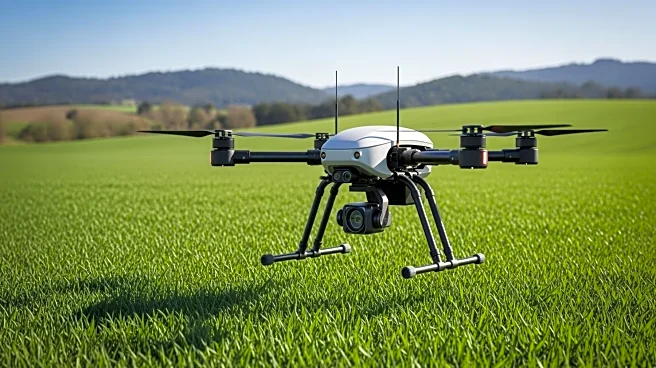What's Happening?
Artificial intelligence and robotics are revolutionizing agriculture by transforming farms into data-driven ecosystems. A study titled 'AI and Robotics in Agriculture: A Systematic and Quantitative Review
of Research Trends (2015–2025)' highlights the technological evolution in agriculture over the past decade. The study, conducted by institutions in Morocco and the United States, analyzed over 10,000 publications to map the integration of machine intelligence into farming. Key technologies such as drones, computer vision, and smart sensors are enabling precision irrigation, pest control, and field mapping. The study identifies China, India, and the United States as leaders in AI and robotic research in agriculture, while regions like Sub-Saharan Africa and Southeast Asia lag behind due to disparities in infrastructure and investment.
Why It's Important?
The integration of AI and robotics in agriculture is crucial for enhancing productivity and sustainability amid climate, labor, and food security challenges. These technologies offer solutions for efficient resource management and improved crop yields, which are vital for meeting global food demands. However, the uneven distribution of technological advancements highlights the need for equitable access to resources and infrastructure. The study emphasizes the importance of developing domain-adaptive AI models and integrating explainable AI frameworks to ensure transparency and reliability. Addressing these challenges is essential for fostering innovation and inclusivity in agriculture, which can lead to more resilient and sustainable food systems.
What's Next?
The study proposes a strategic roadmap for sustainable agricultural AI, advocating for international collaboration and shared data frameworks. It calls for investment in energy-efficient AI models and swarm robotics to enhance scalability and coordination in farming. The authors stress the need for policy frameworks that support responsible AI adoption, particularly in developing regions. By promoting climate-smart AI solutions, the agricultural sector can optimize soil health, water efficiency, and carbon management, aligning with global sustainability goals. The focus on inclusivity and ethical use of technology is expected to drive future advancements in agricultural automation.
Beyond the Headlines
The socioeconomic and ethical implications of automating agriculture are significant, with concerns over labor displacement and data privacy. The study highlights the risk of unemployment in regions where agriculture is a primary livelihood due to the replacement of manual labor with autonomous systems. It underscores the necessity for equitable technology transfer and capacity building to ensure small-scale farmers are not left behind. The authors advocate for a balanced approach that links innovation with social equity and environmental resilience, emphasizing the importance of international collaboration to safeguard ethical use of agricultural AI.









